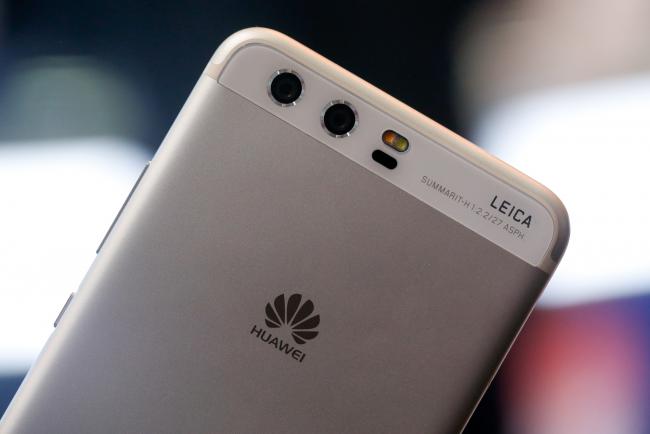(Bloomberg) -- Huawei Technologies Co.’s chief financial officer was arrested in Canada over potential violations of U.S. sanctions on Iran, provoking outrage from China and complicating thorny trade negotiations just as they enter a critical juncture.
Wanzhou Meng — also deputy chairwoman and the daughter of Huawei’s founder — faces extradition to the U.S., said Ian McLeod, a Canada Justice Department spokesman. She was arrested Dec. 1 after the U.S. Department of Justice in April opened an investigation into whether the telecommunications giant sold gear to Iran despite sanctions on exports to the region.
News of Meng’s arrest provoked an immediate protest from the Chinese embassy in Canada, demanding the U.S. and its neighbor “rectify wrongdoings” and free Meng. Her arrest is likely to heighten tensions between Washington and Beijing days after the world’s two largest economies agreed on a truce in their growing trade conflict. Meng’s father Ren Zhengfei, a former army engineer who was named China’s top entrepreneur of the past 40 years, has won acclaim at home for turning an electronics reseller into the world’s second-largest smartphone maker and a major producer of networking gear.
The CFO’s arrest could be regarded back home as an attack on China’s foremost corporate champions. While Alibaba (NYSE:BABA) Group Holding Ltd. and Tencent Holdings Ltd. dominate headlines thanks to flashy growth and high-profile billionaire founders, Ren’s company is by far China’s most global technology company, with operations spanning Africa, Europe and Asia.
Its ambitions range from artificial intelligence and chipmaking to fifth-generation wireless. Its massive push into future mobile communications has raised hackles in the U.S. and become a focal point for American attempts to contain China’s ascendance. Shares in several of its suppliers, including Largan Precision Co. and MediaTek Inc., fell.
“Tencent and Alibaba may be domestic champions and huge platforms in of their own rights, but Huawei has become a global powerhouse,” said Neil Campling, an analyst at Mirabaud Securities Ltd. It is “5G standards that are at the heart of the wider IP debate and why the U.S. and her allies are now doing everything they can to cut to the heart of the Chinese technology IP revolution.”
The arrest was reported earlier by Canada’s Globe and Mail newspaper. The U.S. Justice Department declined to comment about the arrest. A spokeswoman for Canadian Prime Minister Justin Trudeau referred questions to the country’s justice department.
Senator Chris Van Hollen, a Maryland Democrat, said Wednesday night that Huawei and ZTE "are two sides of the same coin – Chinese telecommunications companies that represent a fundamental risk to American national security."
"While the Commerce Department focused its attention on ZTE, this news highlights that Huawei is also violating U.S. Law," Van Hollen said in a statement.
Huawei, in a statement, said the arrest was made on behalf of the U.S. so Meng could be extradited to “face unspecified charges” in the Eastern District of New York.
“The company has been provided very little information regarding the charges and is not aware of any wrongdoing by Ms. Meng,” Huawei said. “The company believes the Canadian and U.S. legal systems will ultimately reach a just conclusion. Huawei complies with all applicable laws and regulations where it operates, including applicable export control and sanction laws and regulations of the UN, U.S. and EU.”
U.S. authorities in 2016 began voicing concerns that Huawei and others could install back doors in their equipment that would let them monitor users in the U.S. Huawei has denied those allegations. The Pentagon stopped offering Huawei’s devices on U.S. military bases citing security concerns. Best Buy Co (NYSE:BBY)., one of the largest electronics retailers in the U.S., also recently stopped selling Huawei products.
In August, U.S. President Donald Trump signed a bill banning the government’s use of Huawei technology based on the security concerns.
Also in August, Australia banned the use of Huawei’s equipment for new faster 5G, or fifth-generation, wireless networks in the country and New Zealand last week did the same, citing national security concerns. Similar moves are under consideration in the U.K. The U.S., which believes Huawei’s equipment can be used for spying, is contacting key allies including Germany, Italy and Japan, to get them to persuade companies in their countries to avoid using equipment from Huawei, the Wall Street Journal reported last week.
In 2016, the Commerce Department sought information regarding whether Huawei was possibly sending U.S. technology to Syria and North Korea as well as Iran. The U.S. previously banned ZTE Corp (HK:0763)., a Huawei competitor, for violating a sanctions settlement over transactions with Iran and North Korea.
In November, Huawei said the moves against it would hinder the development of 5G in the U.S. and raise prices for consumers. Still, the company’s phone business is successful. The Shenzhen-based company has overtaken Apple (NASDAQ:AAPL) as the No. 2 global smartphone maker, shipping more than 52.2 million units in the third quarter, according to research analyst Gartner Inc.
“This is what you call playing hard ball,” said Michael Every, head of Asia financial markets research at Rabobank in Hong Kong. “China is already asking for her release, as can be expected, but if the charges are serious, don’t expect the US to blink.”
(Updates with analyst’s comment in sixth paragraph.)
